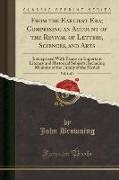Read more
Excerpt from From the Earliest Era; Comprising an Account of the Revival of Letters, Sciences, and Arts, Vol. 1 of 4: Interspersed With Essays on Important Literacy and Historical Subjects; Including Memoirs of the Family of the Medici
A work, like the History of Tuscany by Lorenzo Pignotti, appeared to the translator, during his several years' residence in that country, an object of too great importance to be withheld from the literary part of England. When he first made known to his friends in Florence his intention to undertake the laborious task, they, in general, approved of the project, and few of them doubted of the probable advantage an English version of such an history would prove, or that it would form a valuable addition to the library; but it was at the same time suggested, that the very copious illustrations, which adorn the work, and which are nearly sufficient to form an history of themselves, would demand the most undivided assiduity, and an extension of time beyond that which the translator contemplated.
Feeling, however, a due sense of the value of historical works in general, and appreciating, with the most lively participation, the unusual interest which the present history had awakened in all elegant Tuscans and Italian literati, the translator was determined not to suffer himself to be deterred from a pursuit which delighted him, by any representation that might be made of the labour to be encountered.
About the Publisher
Forgotten Books publishes hundreds of thousands of rare and classic books. Find more at www.forgottenbooks.com
This book is a reproduction of an important historical work. Forgotten Books uses state-of-the-art technology to digitally reconstruct the work, preserving the original format whilst repairing imperfections present in the aged copy. In rare cases, an imperfection in the original, such as a blemish or missing page, may be replicated in our edition. We do, however, repair the vast majority of imperfections successfully; any imperfections that remain are intentionally left to preserve the state of such historical works.

